初中英语:If引导的条件状语从句
- 格式:ppt
- 大小:747.50 KB
- 文档页数:8
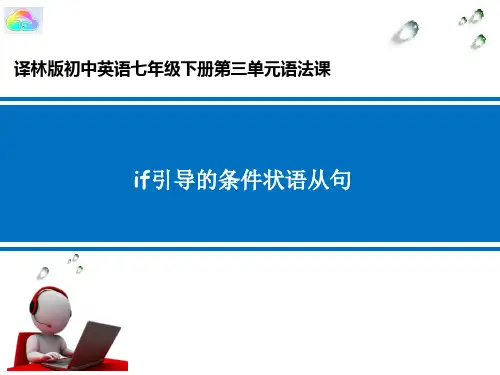
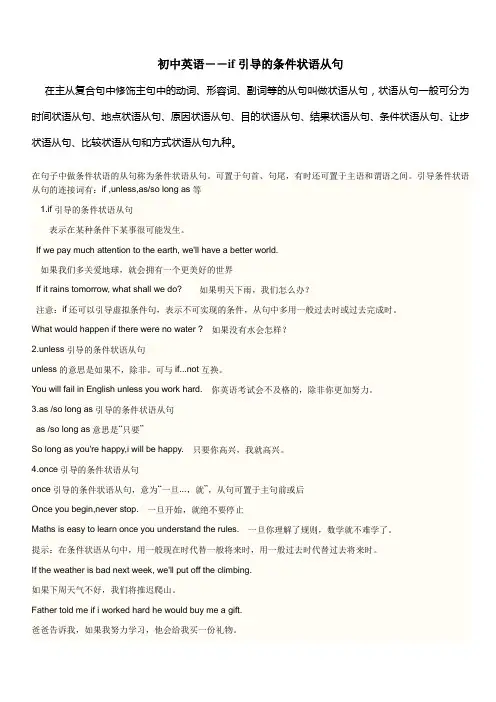
初中英语――if引导的条件状语从句在主从复合句中修饰主句中的动词、形容词、副词等的从句叫做状语从句,状语从句一般可分为时间状语从句、地点状语从句、原因状语从句、目的状语从句、结果状语从句、条件状语从句、让步状语从句、比较状语从句和方式状语从句九种。
在句子中做条件状语的从句称为条件状语从句。
可置于句首、句尾,有时还可置于主语和谓语之间。
引导条件状语从句的连接词有:if ,unless,as/so long as等1.if引导的条件状语从句表示在某种条件下某事很可能发生。
If we pay much attention to the earth, we'll have a better world.如果我们多关爱地球,就会拥有一个更美好的世界If it rains tomorrow, what shall we do? 如果明天下雨,我们怎么办?注意:if还可以引导虚拟条件句,表示不可实现的条件,从句中多用一般过去时或过去完成时。
What would happen if there were no water ? 如果没有水会怎样?2.unless引导的条件状语从句unless的意思是如果不,除非。
可与if...not互换。
You will fail in English unless you work hard. 你英语考试会不及格的,除非你更加努力。
3.as /so long as引导的条件状语从句as /so long as意思是“只要”So long as you're happy,i will be happy. 只要你高兴,我就高兴。
4.once引导的条件状语从句once引导的条件状语从句,意为“一旦...,就”,从句可置于主句前或后Once you begin,never stop. 一旦开始,就绝不要停止Maths is easy to learn once you understand the rules. 一旦你理解了规则,数学就不难学了。
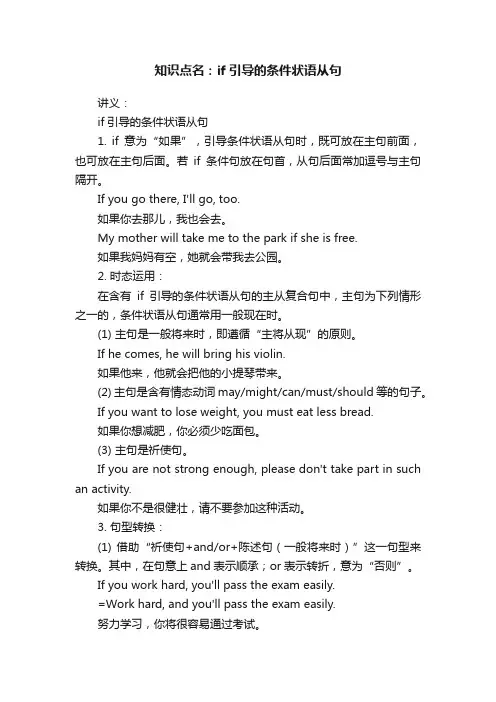
知识点名:if引导的条件状语从句讲义:if引导的条件状语从句1. if意为“如果”,引导条件状语从句时,既可放在主句前面,也可放在主句后面。
若if条件句放在句首,从句后面常加逗号与主句隔开。
If you go there, I'll go, too.如果你去那儿,我也会去。
My mother will take me to the park if she is free.如果我妈妈有空,她就会带我去公园。
2. 时态运用:在含有if引导的条件状语从句的主从复合句中,主句为下列情形之一的,条件状语从句通常用一般现在时。
(1) 主句是一般将来时,即遵循“主将从现”的原则。
If he comes, he will bring his violin.如果他来,他就会把他的小提琴带来。
(2) 主句是含有情态动词may/might/can/must/should等的句子。
If you want to lose weight, you must eat less bread.如果你想减肥,你必须少吃面包。
(3) 主句是祈使句。
If you are not strong enough, please don't take part in such an activity.如果你不是很健壮,请不要参加这种活动。
3. 句型转换:(1) 借助“祈使句+and/or+陈述句(一般将来时)”这一句型来转换。
其中,在句意上and表示顺承;or表示转折,意为“否则”。
If you work hard, you'll pass the exam easily.=Work hard, and you'll pass the exam easily.努力学习,你将很容易通过考试。
Work hard, or you won't pass the exam easily.努力学习,否则你不会轻易地通过考试。
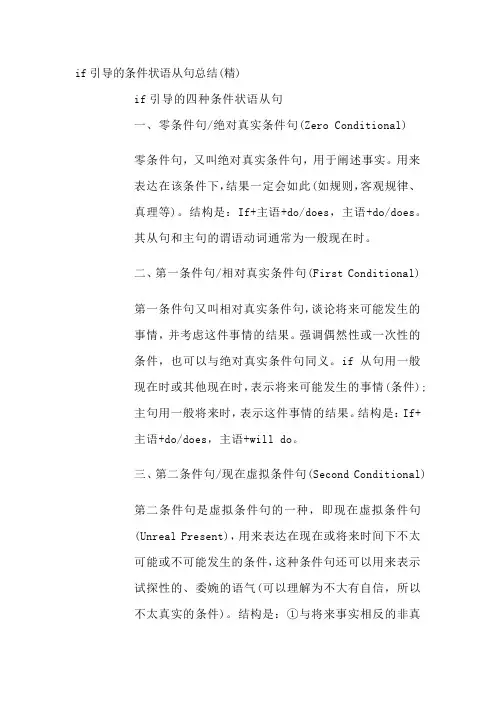
if引导的条件状语从句总结(精)if引导的四种条件状语从句一、零条件句/绝对真实条件句(Zero Conditional)零条件句,又叫绝对真实条件句,用于阐述事实。
用来表达在该条件下,结果一定会如此(如规则,客观规律、真理等)。
结构是:If+主语+do/does,主语+do/does。
其从句和主句的谓语动词通常为一般现在时。
二、第一条件句/相对真实条件句(First Conditional)第一条件句又叫相对真实条件句,谈论将来可能发生的事情,并考虑这件事情的结果。
强调偶然性或一次性的条件,也可以与绝对真实条件句同义。
if从句用一般现在时或其他现在时,表示将来可能发生的事情(条件);主句用一般将来时,表示这件事情的结果。
结构是:If+主语+do/does,主语+will do。
三、第二条件句/现在虚拟条件句(Second Conditional)第二条件句是虚拟条件句的一种,即现在虚拟条件句(Unreal Present),用来表达在现在或将来时间下不太可能或不可能发生的条件,这种条件句还可以用来表示试探性的、委婉的语气(可以理解为不大有自信,所以不太真实的条件)。
结构是:①与将来事实相反的非真实条件句是If+主语+should do/were to do/did,主语+would/should/could/might do;②与现在事实相反的非真实条件句是If+主语+did,主语+would/should/could/might+do。
四、第三条件句/过去虚拟条件句(Third Conditional) 第三条件句是表示与过去事实相反的虚拟语气,是用来表达如果(If)当时那样发生,另外一方面(当时)结果会如何。
通常是指过去的事情,带有一切已经太迟而不能够补救的意思。
结构是:If+主语+had done,主语+would/should/could/ might+have done。
if 条件句的时态搭配1.if从句用一般现在时,主句用一般将来时2.if从句用一般现在时,主句用may/might/canIf the fog gets thicker the plane may/might be diverted.3.if从句用一般现在时,主句用must/shouldIf you want to lose weight you must/should eat less bread.4.if从句用一般现在时,主句用一般现在时5.if从句用现在进行时,主句用一般将来时6.if从句用现在完成时,主句用一般将来时If you have finished dinner I’ll ask the waiter for the bill.。
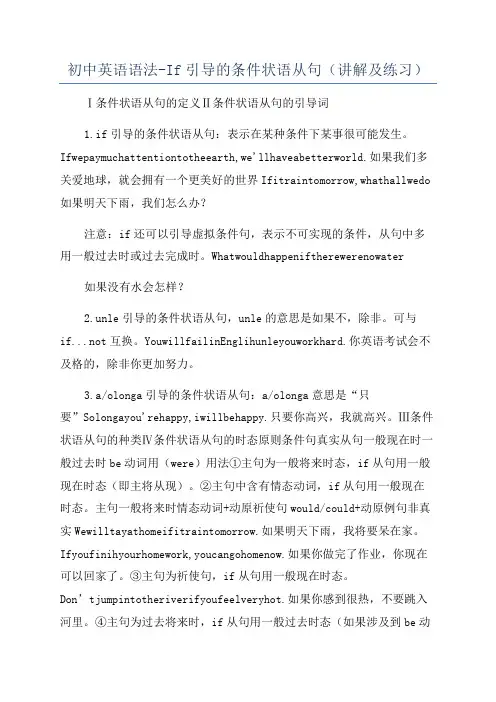
初中英语语法-If引导的条件状语从句(讲解及练习)Ⅰ条件状语从句的定义Ⅱ条件状语从句的引导词1.if引导的条件状语从句:表示在某种条件下某事很可能发生。
Ifwepaymuchattentiontotheearth,we'llhaveabetterworld.如果我们多关爱地球,就会拥有一个更美好的世界Ifitraintomorrow,whathallwedo 如果明天下雨,我们怎么办?注意:if还可以引导虚拟条件句,表示不可实现的条件,从句中多用一般过去时或过去完成时。
Whatwouldhappeniftherewerenowater 如果没有水会怎样?2.unle引导的条件状语从句,unle的意思是如果不,除非。
可与if...not互换。
YouwillfailinEnglihunleyouworkhard.你英语考试会不及格的,除非你更加努力。
3.a/olonga引导的条件状语从句:a/olonga意思是“只要”Solongayou'rehappy,iwillbehappy.只要你高兴,我就高兴。
Ⅲ条件状语从句的种类Ⅳ条件状语从句的时态原则条件句真实从句一般现在时一般过去时be动词用(were)用法①主句为一般将来时态,if从句用一般现在时态(即主将从现)。
②主句中含有情态动词,if从句用一般现在时态。
主句一般将来时情态动词+动原祈使句would/could+动原例句非真实Wewilltayathomeifitraintomorrow.如果明天下雨,我将要呆在家。
Ifyoufinihyourhomework,youcangohomenow.如果你做完了作业,你现在可以回家了。
③主句为祈使句,if从句用一般现在时态。
Don’tjumpintotheriverifyoufeelveryhot.如果你感到很热,不要跳入河里。
④主句为过去将来时,if从句用一般过去时态(如果涉及到be动词,一律都用were)。
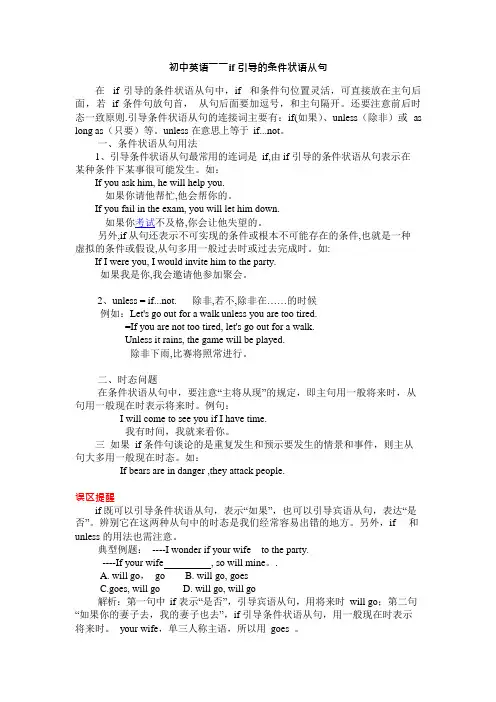
初中英语――if 引导的条件状语从句在if 引导的条件状语从句中,if 和条件句位置灵活,可直接放在主句后面,若if 条件句放句首,从句后面要加逗号,和主句隔开。
还要注意前后时态一致原则.引导条件状语从句的连接词主要有:if(如果)、unless(除非)或as long as(只要)等。
unless 在意思上等于if...not。
一、条件状语从句用法1、引导条件状语从句最常用的连词是if,由if 引导的条件状语从句表示在某种条件下某事很可能发生。
如:If you ask him, he will help you.如果你请他帮忙,他会帮你的。
If you fail in the exam, you will let him down.如果你考试不及格,你会让他失望的。
另外,if 从句还表示不可实现的条件或根本不可能存在的条件,也就是一种虚拟的条件或假设,从句多用一般过去时或过去完成时。
如:If I were you, I would invite him to the party.如果我是你,我会邀请他参加聚会。
2、unless = if...not. 除非,若不,除非在……的时候例如:Let's go out for a walk unless you are too tired.=If you are not too tired, let's go out for a walk.Unless it rains, the game will be played.除非下雨,比赛将照常进行。
二、时态问题在条件状语从句中,要注意“主将从现”的规定,即主句用一般将来时,从句用一般现在时表示将来时。
例句:I will come to see you if I have time.我有时间,我就来看你。
三如果if 条件句谈论的是重复发生和预示要发生的情景和事件,则主从句大多用一般现在时态。
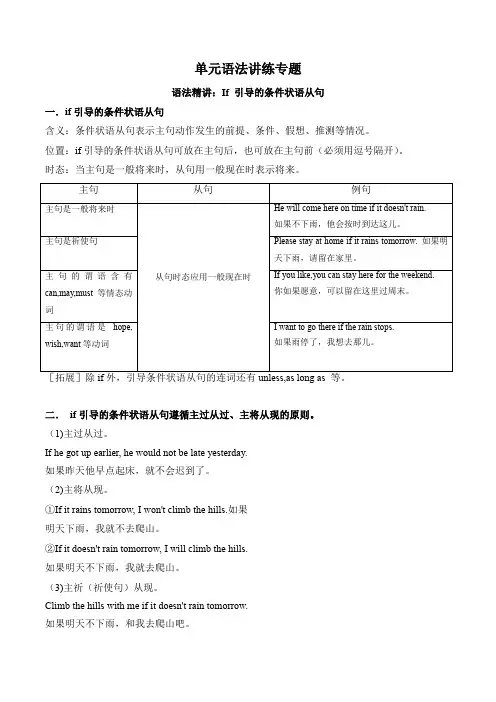
单元语法讲练专题语法精讲:If 引导的条件状语从句一.if引导的条件状语从句含义:条件状语从句表示主句动作发生的前提、条件、假想、推测等情况。
位置:if引导的条件状语从句可放在主句后,也可放在主句前(必须用逗号隔开)。
时态:当主句是一般将来时,从句用一般现在时表示将来。
主句从句例句主句是一般将来时从句时态应用一般现在时He will come here on time if it doesn't rain.如果不下雨,他会按时到达这儿。
主句是祈使句Please stay at home if it rains tomorrow. 如果明天下雨,请留在家里。
主句的谓语含有can,may,must等情态动词If you like,you can stay here for the weekend.你如果愿意,可以留在这里过周末。
主句的谓语是hope, wish,want等动词I want to go there if the rain stops.如果雨停了,我想去那儿。
二.if引导的条件状语从句遵循主过从过、主将从现的原则。
(1)主过从过。
If he got up earlier, he would not be late yesterday.如果昨天他早点起床,就不会迟到了。
(2)主将从现。
①If it rains tomorrow, I won't climb the hills.如果明天下雨,我就不去爬山。
②If it doesn't rain tomorrow, I will climb the hills.如果明天不下雨,我就去爬山。
(3)主祈(祈使句)从现。
Climb the hills with me if it doesn't rain tomorrow.如果明天不下雨,和我去爬山吧。
(4)主情(情态动词)从现。
If it doesn't rain tomorrow, I might climb the hills.如果明天不下雨,我可能会去爬山。
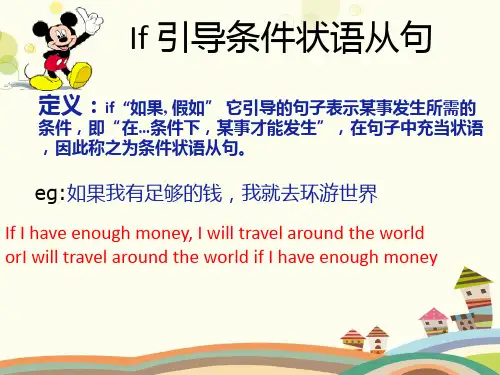
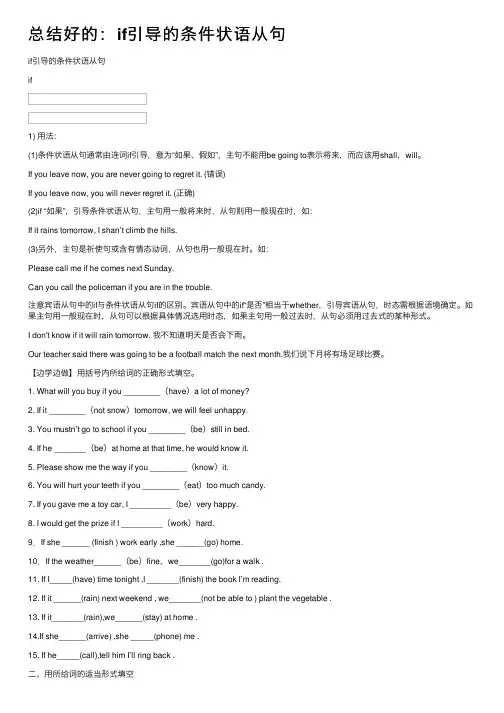
总结好的:if引导的条件状语从句if引导的条件状语从句if1) ⽤法:(1)条件状语从句通常由连词if引导,意为“如果、假如”,主句不能⽤be going to表⽰将来,⽽应该⽤shall,will。
If you leave now, you are never going to regret it. (错误)If you leave now, you will never regret it. (正确)(2)if “如果”,引导条件状语从句,主句⽤⼀般将来时,从句则⽤⼀般现在时,如:If it rains tomorrow, I shan’t climb the hills.(3)另外,主句是祈使句或含有情态动词,从句也⽤⼀般现在时。
如:Please call me if he comes next Sunday.Can you call the policeman if you are in the trouble.注意宾语从句中的if与条件状语从句if的区别。
宾语从句中的if“是否”相当于whether,引导宾语从句,时态需根据语境确定。
如果主句⽤⼀般现在时,从句可以根据具体情况选⽤时态,如果主句⽤⼀般过去时,从句必须⽤过去式的某种形式。
I don't know if it will rain tomorrow. 我不知道明天是否会下⾬。
Our teacher said there was going to be a football match the next month.我们说下⽉将有场⾜球⽐赛。
【边学边做】⽤括号内所给词的正确形式填空。
1. What will you buy if you ________(have)a lot of money?2. If it ________(not snow)tomorrow, we will feel unhappy.3. You mustn’t go to school if you ________(be)still in bed.4. If he _______(be)at home at that time, he would know it.5. Please show me the way if you ________(know)it.6. You will hurt your teeth if you ________(eat)too much candy.7. If you gave me a toy car, I _________(be)very happy.8. I would get the prize if I _________(work)hard.9.If she ______ (finish ) work early ,she ______(go) home.10.If the weather______(be)fine,we_______(go)for a walk .11. If I_____(have) time tonight ,I _______(finish) the book I’m reading.12. If it ______(rain) next weekend , we_______(not be able to ) plant the vegetable .13. If it_______(rain),we______(stay) at home .14.If she______(arrive) ,she _____(phone) me .15. If he_____(call),tell him I’ll ring back .⼆、⽤所给词的适当形式填空1. If you ________(feel) tired, you _________ (have) to have a rest.2. Where _____ he ____(see) the film if he _________(have) time?3. If there ____ (be) fewer trees, there _______ (be) more pollution.4. He ___ (dress) more casually if he ___ (not work) on weekends.5. If Marcia _______ (live) alone, she _______ (keep) a pet parrot.6. Lana _____ (buy) a new dress if the old one ____ (be) out of style.7. The twins _______ (fight) if they__________ (argue).8. I ______ (have) a bake sale if I ____ (need) money for education.9. Peter ____ (send) me a beautiful souvenir if he ____(tour) Spain.10. If Mr. Green _______ (say) I am hard- working, my parents ___ (feel) glad.11. I ______ (go) to the beach if it________ (not rain) this week.12. _____they ___ (have) a match if the P.E. teacher __ (be) busy?13. He ____ (write) a letter to his grandparents if he ____ (get) his report card this week.14. If she ______ (get) up late, she _____ (not catch) the early bus.15. Peter ____ (major) in English if he ____(pass) the exams in Peking University.⼆、完成句⼦1. 他如果看电视太久了,他的⽗母会不⾼兴。
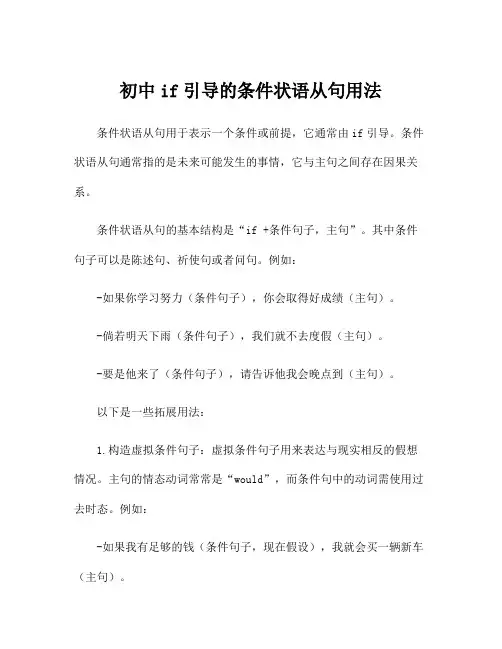
初中if引导的条件状语从句用法条件状语从句用于表示一个条件或前提,它通常由if引导。
条件状语从句通常指的是未来可能发生的事情,它与主句之间存在因果关系。
条件状语从句的基本结构是“if +条件句子,主句”。
其中条件句子可以是陈述句、祈使句或者问句。
例如:-如果你学习努力(条件句子),你会取得好成绩(主句)。
-倘若明天下雨(条件句子),我们就不去度假(主句)。
-要是他来了(条件句子),请告诉他我会晚点到(主句)。
以下是一些拓展用法:1.构造虚拟条件句子:虚拟条件句子用来表达与现实相反的假想情况。
主句的情态动词常常是“would”,而条件句中的动词需使用过去时态。
例如:-如果我有足够的钱(条件句子,现在假设),我就会买一辆新车(主句)。
-如果我能回到过去(条件句子,现在不可能),我会改变很多事情(主句)。
2.使用倒装结构:如果条件句以“had”或是“were”开头时,可以使用倒装结构。
例如:- Had I known you were sick(条件句子),I would have visited you(主句).- Were I taller(条件句子),I could reach the top shelf (主句).3.使用“unless”表示否定条件:除了使用“if”之外,我们也可以使用“unless”来引导否定条件状语从句。
例如:- Unless you study hard(条件句子),you won't pass the test(主句).- We won't have a picnic(主句)unless it stops raining (条件句子).总之,条件状语从句用于表示可能发生的条件情况,其语法结构为“if +条件句子,主句”。
拓展用法包括虚拟条件句子、倒装结构和使用“unless”来表示否定条件。
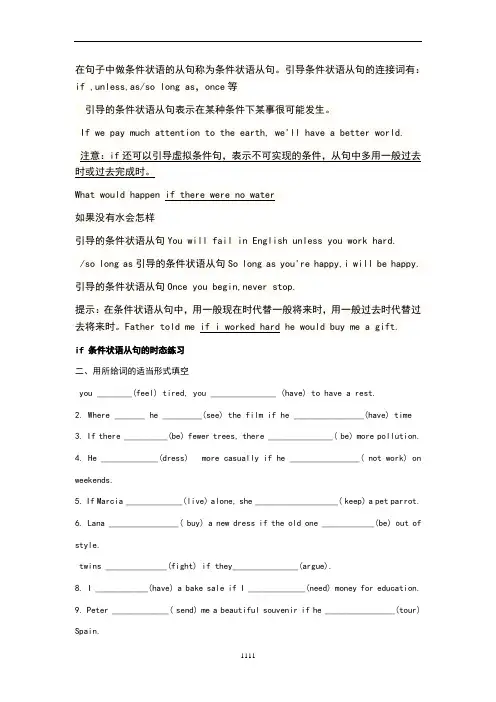
在句子中做条件状语的从句称为条件状语从句。
引导条件状语从句的连接词有:if ,unless,as/so long as,once等引导的条件状语从句表示在某种条件下某事很可能发生。
If we pay much attention to the earth, we'll have a better world.如果没有水会怎样引导的条件状语从句You will fail in English unless you work hard./so long as引导的条件状语从句So long as you're happy,i will be happy.引导的条件状语从句Once you begin,never stop.提示:在条件状语从句中,用一般现在时代替一般将来时,用一般过去时代替过if 条件状语从句的时态练习二、用所给词的适当形式填空you ________(feel) tired, you _______________ (have) to have a rest.2. Where _______ he _________(see) the film if he ________________(have) time3. If there __________(be) fewer trees, there _______________( be) more pollution.4. He _____________(dress) more casually if he ________________( not work) on weekends.5. If Marcia _____________(live) alone, she ___________________( keep) a pet parrot.6. Lana ________________( buy) a new dress if the old one ____________(be) out of style.twins ______________(fight) if they_______________(argue).8. I ____________(have) a bake sale if I _____________(need) money for education.9. Peter _____________( send) me a beautiful souvenir if he ________________(tour) Spain.10. If Mr Green ___________(say) I am hard- working, my parents _________( feel) glad.____________(go) to the beach if it________________ ( not rain) this week.12. __________they __________( have) a match if the . teacher _____________(be) busy ____(write) a letter to his grandparents if he ____(get) his report card this week.14. If she ____________(get) up late, she _____________ ( not catch) the early bus.15. Peter ________(major) in English if he ____(pass) the exams in Peking University.15.如果他到的晚了会发生什么事情What _______________ if he _____________ late16. 如果努力学习,你就会取得好成绩。
初中英语――if引导的条件状语从句在if 引导的条件状语从句中,if 和条件句位置灵活,可直接放在主句后面,若if 条件句放句首,从句后面要加逗号,和主句隔开。
还要注意前后时态一致原则.引导条件状语从句的连接词主要有:if(如果)、unless(除非)或as long as (只要)等。
unless在意思上等于if...not。
一、条件状语从句用法1、引导条件状语从句最常用的连词是if,由if引导的条件状语从句表示在某种条件下某事很可能发生。
如:If you ask him, he will help you.如果你请他帮忙,他会帮你的。
If you fail in the exam, you will let him down.如果你考试不及格,你会让他失望的。
另外,if从句还表示不可实现的条件或根本不可能存在的条件,也就是一种虚拟的条件或假设,从句多用一般过去时或过去完成时。
如:If I were you, I would invite him to the party.如果我是你,我会邀请他参加聚会。
2、unless = if...not.除非,若不,除非在……的时候例如:Let's go out for a walk unless you are too tired.=If you are not too tired, let's go out for a walk.Unless it rains, the game will be played.除非下雨,比赛将照常进行。
二、时态问题在条件状语从句中,要注意“主将从现”的规定,即主句用一般将来时,从句用一般现在时表示将来时。
例句:I will come to see you if I have time.我有时间,我就来看你。
三如果if 条件句谈论的是重复发生和预示要发生的情景和事件,则主从句大多用一般现在时态。
如:If bears are in danger ,they attack people.误区提醒if 既可以引导条件状语从句,表示“如果”,也可以引导宾语从句,表达“是否”。
初中英―― if 引的条件状从句在 if 引的条件状从句中, if 和条件句位置灵活,可直接放在主句后面,若 if 条件句放句首,从句后面要加逗号,和主句隔开。
要注意前后一致原 .引条件状从句的接主要有: if( 如果)、unless(除非)或 as long as(只要)等。
unless在意思上等于 if...not。
一、条件状从句用法1、引条件状从句最常用的是if, 由 if 引的条件状从句表示在某种条件下某事很可能生。
如:If you ask him, he will help you.如果你他帮忙 ,他会帮你的。
If you fail in the exam, you will let him down.如果你考不及格 ,你会他失望的。
另外 ,if 从句表示不可的条件或根本不可能存在的条件 ,也就是一种虚的条件或假 ,从句多用一般去或去完成。
如 :If I were you, I would invite him to the party.如果我是你 ,我会邀他参加聚会。
2、 unless = if...not. 除非 ,若不 ,除非在⋯⋯的候例如:Let's go out for a walk unless you are too tired.=If you are not too tired, let's go out for a walk.Unless it rains, the game will be played.除非下雨 ,比将照常行。
二、在条件状从句中,要注意“主将从”的定,即主句用一般将来,从句用一般在表示将来。
例句:I will come to see you if I have time.我有,我就来看你。
三如果 if 条件句的是重复生和示要生的情景和事件,主从句大多用一般在。
如:If bears are in danger ,they attack people.区提醒if 既可以引条件状从句,表示“如果”,也可以引从句,表达“是否”。